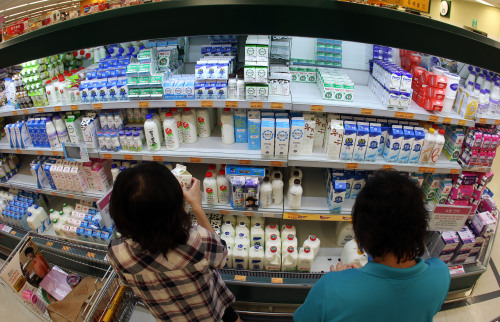Dairy farmers and milk producers reached a long delayed agreement Tuesday on a hike in the price of raw milk, a move feared to make milk products more expensive and add to inflationary pressure.
 |
(Yonhap News) |
The agreement, effective immediately from Tuesday, calls for raising the average price of raw milk by 130 won per liter from the current 704 won ($0.66) to 834 won.
"Negotiations on the rise of the raw milk price were successfully concluded as both producers and milk companies agreed to accept the government proposal for a 130 won increase," the Korea Dairy and Beef Farmers Association said in a released statement.
The sides also agreed to ease price gaps between different grades of milk, a move the association earlier said would have the same effect of raising the average price of raw milk by an additional 8 won per liter. Tuesday's agreement was reached after several rounds of negotiations between the association and milk companies that began June 21.
The dairy farmers' association earlier demanded an increase of
173 won per liter, claiming the current price did not even cover their costs. The current price of raw milk was set in 2008 and has remained unchanged since.
Milk companies, however, offered to raise the price by only 81 won, although they later offered a 130 won increase.
The 130 won increase, approved on Tuesday, was proposed by the government last week after the two sides failed to overcome their differences after nearly two months of negotiations, prompting dairy farmers to stop supplying raw milk to milk companies for three days from Wednesday.
The rise of the raw milk price will inevitably lead to a price hike for milk products, but the shelf price of milk is expected to rise by a significantly larger margin.
Some of the milk companies are expected to reflect the rise of their other costs, such as labor, in their latest price hike, leading to a price increase of 300 won to 400 won per liter.
A rise in milk prices will also lead to a price increase for other milk-based dairy products, including butter, cheese and even bread, exerting further upward pressure on the country's already high consumer prices.
South Korea's consumer prices jumped 4.4 percent from a year earlier in July, surpassing the government's annual inflation target of 4 percent for the seventh straight month.
Agriculture Minister Suh Kyu-yong earlier said the government has asked the country's milk companies to delay their price hikes at least until next year.
The companies have already refused to comply, though not explicitly, saying the rise of prices is also taking heavy tolls on their costs. (Yonhap News)
<한글기사>
원유 협상타결..우유 가격 얼마나 오르나
낙농가와 유업체가 16일 원유(原乳) 가격 인상 에 합의함에 따라 우윳값이 오를 것으로 예상된다.
유가공업계는 구체적인 언급을 피하고 있지만, 원유가격을 올리기로 한 이상 가 격을 인상하지 않을 수 없다는 태도다.
원유는 ℓ당 138원 오르지만, 선례를 볼 때 소비자가 체감하는 우유 가격의 인 상 폭은 이보다 훨씬 클 것으로 보인다.
유가공업체 입장에서는 몇 년 주기로 반복되는 원유 가격 인상 때 운송비나 인 건비, 가공비용 등 생산과 판매에 필요한 다른 비용 상승분을 반영해야 하기 때문이 다.
앞서 2008년 8월 원유가격을 ℓ당 584원에서 704원으로 120원 인상했을 때는 일 주일 만에 서울우유의 소비자 가격이 대형할인점을 기준으로 1천850원에서 300원 올 라 2천150원이 됐다.
제조사나 판매처에 따라 차이가 있지만, 원유 가격이 20.5% 오를 때 대형 마트 를 기준으로 16.2% 인상한 것인데 유가공업계는 이번에도 비슷한 수준의 상승이 불 가피하다는 분위기다.
이번에는 원유가를 19.6% 인상하기로 했기 때문에 같은 비례로 계산한다면 서 울우유를 기준으로 15.4% 정도 상승할 것이라는 추정이 가능하고 이 경우 현재 대 형 할인점에서 1ℓ에 2천150원인 서울우유가 약 2천481원이 된다.
가격 인상 시기에 대해서는 전망이 엇갈리는 편이다.
원유 가격 고시에 걸리는 기간 등을 고려하면 협상 타결일로부터 한두 달 내에 인상해야 한다는 게 유가공 회사의 의견이다.
하지만, 정부가 가격 인상을 늦추도록 압박하는 점이 변수다.
유업체는 연말까지 가격을 올려서는 안 된다는 게 정부 방침이라서 원가 변동을 가격에 반영하기 쉽지 않은 상황이라고 얘기하고 있다.
올해 상반기에 농수산물과 공산품 등 각종 생필품 인상으로 서민 생활이 어려운 데 기다렸다는 듯이 우유 가격을 올리면 국민의 따가운 시선이 쏟아질 것이 뻔하기 때문이다.
하지만, 유업계는 판매로 얻는 이윤이 출고가의 3%가 채 되지 않는 상황에서 원가가 138원이나 오르면 바로 손해를 보게 되므로 연말까지 버티는 것은 무리라는 입장이다.
업계의 한 관계자는 "원유가격이 인상됐는데 유제품 값을 올리지 않으면 유가공 업체는 당장 역마진을 감수해야 하는 상황"이라고 말했다.
또 다른 관계자는 "전체적인 사회 분위기나 소비자 반응도 봐야 한다"며 "업체 입장에서 가격 인상 요인이 있어 올리기를 희망하고 있지만 쉽게 올릴 수 없어 지켜 보고 있다"고 분위기를 전했다.
결국, 가격은 원유가 상승분을 반영하는 선에서 수개월 내에 오를 가능성이 크 지만, 정부의 자제 요청과 소비자의 반응 등에 따라 시기와 폭을 두고 '눈치작전'이 벌어질 전망이다.
아울러 분유나, 발효유 등 원유를 주 원료로 한 제품은 물론 커피 전문점의 음 료나 제과업계에서 우유를 사용하는 제품 등의 가격 등이 줄줄이 인상 압력을 받게 될 전망이다.
한편, 민주당 김영록 의원이 밝힌 바로는 우유의 소매가가 ℓ당 평균 2천180원 인 반면 출고 가격은 1천442원에 불과해 유통 마진이 소매가의 33.8%에 달하는 것 으로 나타나 유통 비용을 줄이려는 노력도 필요하다는 지적도 있다.








